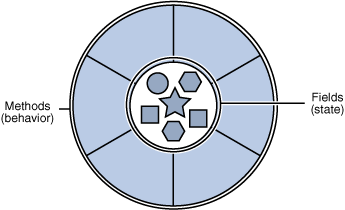CSC/ECE 517 Fall 2011/ch1 1h ps: Difference between revisions
No edit summary |
No edit summary |
||
| Line 28: | Line 28: | ||
</table> | </table> | ||
<p>In the above pseudo code, the attributes define the object and the methods provide a way of achieving the desired functionality from that object. The methods use the attributes to manipulate the object and achieve the functionality. From this we can observe that this manipulation is the very essence of programming using objects. Therefore the access of attributes and way of defining method calls very important in OOP.</p> | <p>In the above pseudo code, the attributes define the object and the methods provide a way of achieving the desired functionality from that object. The methods use the attributes to manipulate the object and achieve the functionality. From this we can observe that this manipulation is the very essence of programming using objects. Therefore the access of attributes and way of defining method calls very important in OOP.</p> | ||
== 3rd header == | |||
== 4th header == | |||
Revision as of 23:26, 7 September 2011
Common Attribute/Member Syntax
Different object oriented programming languages include different ways of accessing the member variables and methods. This page discusses the various usages and their advantages and disadvantages.
Introduction
The purpose of Object Oriented Programming is to make programs model things the way people think or deal with the world i.e it's modeled around data rather than logic. Objects form the basis of OOP. Let us now look at objects, their manipulation and the ways to do so.
Objects - Attributes and Methods
In the above pseudo code, the attributes define the object and the methods provide a way of achieving the desired functionality from that object. The methods use the attributes to manipulate the object and achieve the functionality. From this we can observe that this manipulation is the very essence of programming using objects. Therefore the access of attributes and way of defining method calls very important in OOP.
